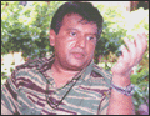"
I rise to apprise this august House about the present situation in Sri
Lanka.
Since I last addressed the House on this issue in October 2008, developments
have unfolded rapidly in northern Sri Lanka. Sri Lankan Government forces
have made significant advances into LTTE-held territory, restricting LTTE
cadres to a small area of approximately 150 sq. km. adjacent to the coast.
Sri Lankan forces have captured Kilinochchi, Elephant Pass and Mullaitivu
town and have regained control of the A-9 highway.
A serious source of concern to us has been the condition of civilians and
internally displaced persons, mostly Tamil, caught up in the zone of
conflict. Estimates on the number of civilians trapped vary, but 70,000 or
so are estimated to be there now. The LTTE were reportedly using them as
human shields.
Hon�ble Members may rest assured that our strong concerns for the safety,
security and welfare of civilians caught in the conflict have led us to stay
actively engaged to prevent a further deterioration of humanitarian
conditions.
Comment by
tamilnation.org
" We have a very comprehensive relationship
with Sri Lanka. In our anxiety to protect the civilians, we should not
forget the strategic importance of this island to India's interests,...
especially in view of attempts by countries like Pakistan and China to gain
a strategic foothold in the island nation...Colombo had been told that India
would "look after your security requirements, provided you do not look
around". "We cannot have a playground of international players in our
backyard." Indian External Affairs Minister Pranab Mukherjee,
23 October 2008
We have sent relief supplies to the civilians and the IDPs,
facilitated access by international and UN organisations, and suggested ways
for civilians and IDPs to escape from the conflict zone. Two batches of
relief assistance have been sent so far including 80,000 family packs of
food and non-food articles, collected and donated by the Government of Tamil
Nadu and medicines. Another batch of relief material is being sent.
I personally visited Colombo on 27th January. In my discussions with Sri
Lankan President Mahinda Rajapaksa, I stressed the need to give an
opportunity to civilians and IDPs caught up in the conflict to emerge from
LTTE held areas and suggested a pause in hostilities to provide the
necessary environment. On 29th January 2009, the Sri Lankan President
announced a 48-hour period for civilian safe passage to secure areas. He
also appealed to the LTTE to allow civilians to leave and assured the safety
and security of the civilians who did so.
In the last two weeks, nearly 35,000 civilians have come out of LTTE-held
areas. Sadly some of those escaping from the conflict have been caught in
cross-fire and, in recent incidents have been stopped and even killed by
LTTE cadres.
Comment by
tamilnation.org
"Having
failed to condemn
the
shelling by
Sri Lanka of self announced safety zones,
which killed hundreds of Tamils and gravely injured many
thousands more; having failed to prevent
Sri Lanka's deliberate targeting
of hospitals; having refused to recognise that Sri Lanka's
resort to genocide was no accident but is directed to give
Tamil civilians a clear message – ‘get away from the LTTE
controlled areas or die’ and therefore
a war crime; Mr.Mukherjee says that 'the
LTTE were reportedly using them as human shields'
and suggests that Tamil civilians are 'trapped in the fighting in the
Vanni' when in truth Tamil civilians are not 'trapped in the fighting'
or in the crossfire but are being deliberately targeted and killed
by Sri Lanka armed forces."
As the conflict enters what may be the final phase of military
operations, the LTTE would best serve the interest of the Tamils by
immediately releasing all civilians and laying down arms.
The Government of India is ready to facilitate the evacuation of civilians
trapped in the area of conflict, working with the Government of Sri Lanka
and the ICRC who would take responsibility for the security, screening and
rehabilitation of these internally displaced persons.
Mr. Speaker,
India continues to support a negotiated political settlement in Sri Lanka
within the framework of an undivided Sri Lanka acceptable to all the
communities, including the Tamil community. The LTTE remains a proscribed
organisation in India and has done much damage to the Tamil community.
Comment by
tamilnation.org
"The LTTE's emergence as the most dominant and effective politico-military force
representing Tamil interests was due to the following factors:
 First, the character and personality of its leader V
Pirabaharan who is disciplined, austere and passionately committed to the cause of Sri
Lankan Tamils' liberation. Whatever he may be criticised for, it cannot be denied that the
man has an inner fire and dedication and he is endowed with natural military abilities,
both strategic and tactical. He has also proved that he is a keen observer of the nature
of competitive and critical politics. He has proved his abilities in judging political
events and his adroitness in responding to them.
First, the character and personality of its leader V
Pirabaharan who is disciplined, austere and passionately committed to the cause of Sri
Lankan Tamils' liberation. Whatever he may be criticised for, it cannot be denied that the
man has an inner fire and dedication and he is endowed with natural military abilities,
both strategic and tactical. He has also proved that he is a keen observer of the nature
of competitive and critical politics. He has proved his abilities in judging political
events and his adroitness in responding to them.
Secondly, he has created a highly disciplined, and dedicated cadres, a manifestation of
which is inherent in what is called the 'cyanide cult.' Each regular member of the LTTE
carries a cyanide pill and is pledged to committing suicide rather than being captured by
the enemy.
The third factor is the cult and creed of honesty in the disbursement and
utilisation of resources. Despite long years spent in struggle, the LTTE cadres were known
for their simple living, lack of any tendency to exploit the people and their operational
preparedness.
The fourth factor has been the LTTE's ability to upgrade its political and military
capacities including technological inputs despite the constraints imposed on it by Sri
Lankan forces and later by India.
The fifth factor is a totally amoral and deadly violent approach in dealing with those
the LTTE considers as enemies.
The sixth factor is Pirabaharan's success in gathering around him senior
advisers with diverse political, administrative and technological capacities, which
contributed to effective training of his cadres, optimum utilisation of the military
equipment which he had, and the structuring of an efficient command and control
system.
(Assignment Colombo, by J N Dixit, Konarak Publishers,
1998)
"As far as I can tell most ordinary Tamils support the Tigers, not necessarily
because they like them, but because they like the Sri Lankan - or Indian - armies less.
The
Tigers are ruthless and authoritarian but they are not corrupt - they don't tolerate
stealing, bribery or rape, things other armies are famous for. In fact they are
perceived as being single minded in their defence of Tamils. They are so disciplined that
when captured, they swallow cyanide capsules that they carry with them at all times,
rather than risk revealing anything under torture."
(Statement before US
Congress Committee on International Relations Subcommittee on Asia and the Pacific Hearing
on Sri Lanka November 14,1995)
"I have a high regard for the LTTE for its discipline,
dedication, determination, motivation and technical expertise... I was left with the
impression that the LTTE was the expression of popular Tamil sentiment and could not be
destroyed, so long as that sentiment remained... Our unit and
formation commanders too came under the mental hypnosis of the LTTE. They
would graphically explain how well entrenched the LTTE was in the minds of
the people, how ungrateful people were to us, how elusive the LTTE was, how
perfect it was in the midst of the people and in its actions, how effective
was its grip over the public and so on - virtually admitting that it was an
impossible task and all our endeavours were pointless. " (Lieutenant General S.C.
Sardesh Pande in "Assignment
Jaffna", published in 1992)
In this context, the earlier normal democratic political processes begin in
Sri Lanka the better. In our view, after 23 years of conflict, there is
today a political opportunity to restore life to normalcy in the Northern
Province and throughout Sri Lanka. The President of Sri Lanka assured me
that this is also his intent. The full implementation of the 13th Amendment
to the Sri Lankan Constitution would be a significant first step. Honourable
Members would recall that the 13th Amendment was introduced to give effect
to the India-Sri Lanka accord in 1987. Going beyond the 13th Amendment on
the question of devolution of powers would be significant.
 Comment by
tamilnation.org
Comment by
tamilnation.org
"New Delhi's continued reference to the comic opera
reforms of the 13th Amendment as a way of resolving the conflict in
the island, is simply its own way of getting Sri
Lanka back on track to the
Indo
Sri Lanka Accord and the
Exchange of Letters that secured New Delhi's strategic interests
in its 'backyard'. As in 1987, so also today - the
comic
opera reforms of the 13th Amendment have little to do with
satisfying the aspirations of the people of Tamil Eelam for freedom
from alien Sinhala rule and everything to do with New Delhi's
concern to prevent its 'backyard' becoming 'a playground of
international players'."
India is ready to work with the Government of Sri Lanka in their important
tasks of rehabilitation and reconstruction which lie ahead in Sri Lanka,
particularly the north and east. We have begun steps to implement
developmental projects in the Eastern Province such as a 500 MW thermal
power project, assistance for a rail bus project and the setting up of IT
centres.